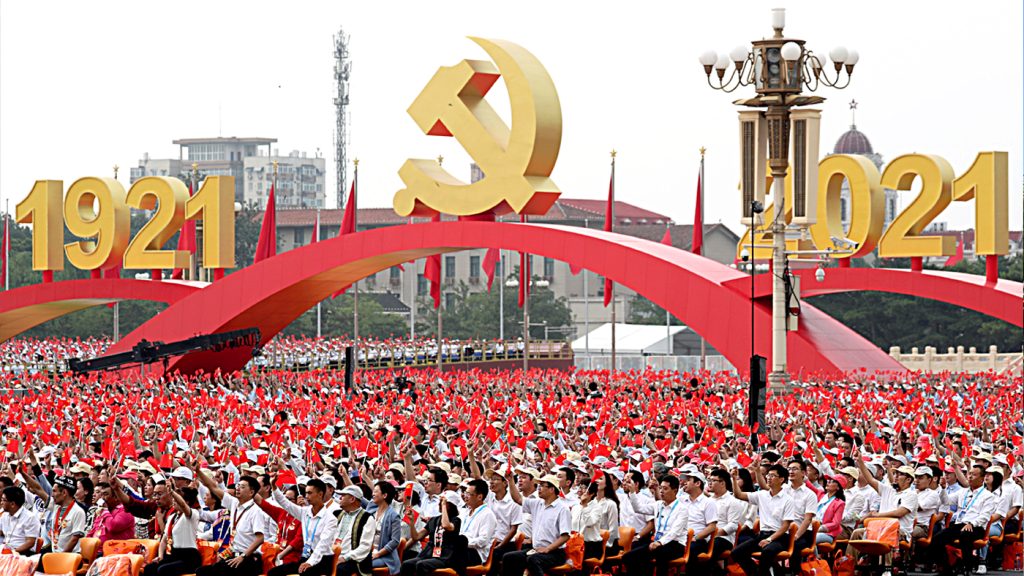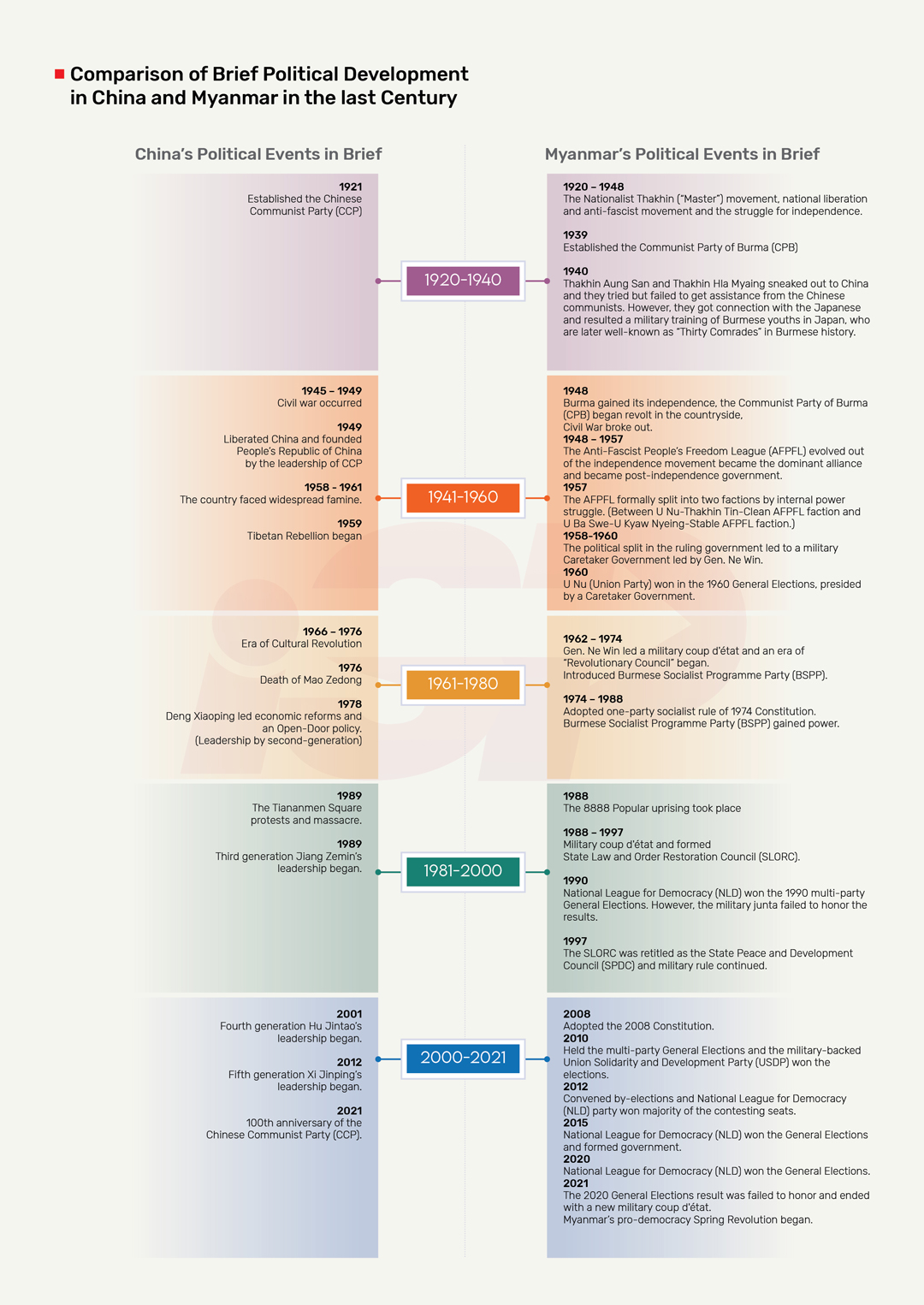(This article is a translation of the Burmese language version that ISP-Myanmar posted on its Facebook page on July 7, 2021.)

Founded in 1921, the Chinese Communist Party (CCP) celebrated its centenary in July 2021. When the Soviet Union collapsed in 1992, there were speculations that the Chinese Communist Party would soon follow suit, but for 100 years the party has stood tall. Since the founding of the People’s Republic of China in 1949, the CCP has been the ruling party and has now been in power for more than 72 years. Despite the changing leadership of the party, the civil war, the famine, the Cultural Revolution, and the 1989 Tiananmen Square pro-democracy movement, the Chinese Communist Party has held on to political leadership through it all.
This article presents the leadership of the Chinese Communist Party, its foreign relations policy, as well as its specific relationship with Myanmar political parties. Myanmar’s political landscape has been in turmoil, fluctuating between many political parties since the year 1948 when Myanmar gained independence. Due to several military coups since 1962, party politics (either a one-party system or multi-party system) has not functioned sustainably for the betterment of the people. Relationships with China have also been strained by successive military dictatorships, and this has not been helpful in building a modern Myanmar. For Myanmar’s political system to be stable and for multi-party democracy to flourish, it is crucial for the military to know its place and for institutions like political parties to be able to withstand pressure as well. This article considers role models in the Asia region, particularly the Chinese Communist Party, to show the importance of building partnerships with these parties.
Leadership and Foreign Relations Policy of the Chinese Communist Party
Ruling over a population of 1.4 billion people, the Chinese Communist Party, which has just over 9 million members, has been in power for years without any democratic elections. One of the main reasons for its ability to remain in power is its drive for economic growth. Under the leadership of the CCP, today China is the world’s second largest economy. China’s per capita gross domestic product (GDP) has risen from around US$ 200 in 1980 to more than US$ 10,000 in 2019. At the same time, the party has lifted more than 770 million Chinese people out of poverty. Additionally, subway systems, bullet trains, highways, skyscrapers, and world-class international airports have emerged rapidly across the country in just a few decades. The ability to develop the country’s economy and raise the living standards of its citizens has strengthened the leadership of the CCP in China.
The Chinese Communist Party has had many profound impacts on the daily lives of the Chinese people over the past 100 years. The party has also been active outside the domestic sphere, forming relationships with political parties from other countries and shaping China’s foreign relations policy. Since the founding of the People’s Republic of China, the CCP’s Foreign Relations Office has established inter-party relations with communist parties from other countries and these have been key to China’s foreign relations. Inter-party relations between the CCP and its counterpart in foreign countries allows China to bypass some of the formalities of official foreign diplomacy while still being able to influence other countries to its own advantage. Thus inter-party relations have a big impact on bilateral relations and cooperation. The inter-party relations between the CCP and other countries’ political parties have also become an important mechanism for building economic cooperation. In 2010, the first high-level meetings between the CCP and US political parties were held in Beijing and Washington. Even approaching relations with the United States, arguably China’s most important bilateral relationship, under the framework of inter-party relations puts a spotlight on the importance of inter-party relations in China’s foreign policy.
Since taking office, President Xi Jinping has focused on building relations with foreign parties, and we can see that mutual learning and sharing programs with the CCP have become a priority. Studies have shown that the CCP has been influential on foreign political parties not only in terms of their political and economic positions related to foreign policy with China, but also in terms of their positions and capabilities related to their own domestic politics. At present, the Chinese Communist Party has established official relations with more than 600 political parties in about 160 countries.

Relations with Myanmar’s Political Parties
Just as the Chinese Communist Party has always approached relations with other countries through its political party allies, inter-party relations have also played an important role in its relationship with Myanmar. But due to the instability of successive military dictatorships, the relationship between China-Myanmar political parties has been strained, hindering progress towards building a modern Myanmar.
Since the establishment of China-Myanmar diplomatic relations, China has had relations with the legitimate government of Myanmar and has also provided support to political parties in Myanmar under the framework of inter-party relations: for example, supporting the Communist Party of Burma (CPB) when it was revolting against the Myanmar government. After the launch of its Reform and Opening Up policies in 1978, the CCP gradually reduced relations with the CPB, and by 1989 the Communist Party of Burma had disbanded its armed wing.
After the 1988 coup, Myanmar fell under military rule and China-Myanmar relations became more intergovernmental than party-to-party. Although there have been several visits by CCP leaders to Myanmar, the party’s foreign policy mechanism did not have much effect between 1988 and 2010 as the military junta did not have a corresponding political party. However, with the official re-emergence of political parties leading up to the 2010 elections, the CCP revived party-to-party relations with Myanmar political parties. In 2012, then-Vice President Xi Jinping met with the General Secretary of the Union Solidarity and Development Party (USDP), Htay Oo, to discuss building closer ties between the CCP and the USDP. On the other hand, the CPC has also built inter-party relations with the National League for Democracy (NLD), which won the 2012 by-elections and entered parliamentary politics under the 2008 constitution. Leading up to the 2015 general election, Aung San Suu Kyi, Chairperson of the NLD, was formally invited to China to discuss inter-party relations. China was able to establish relations with the political party that had a high chance of winning the election, and this has greatly helped China-Myanmar relations after 2015 under the NLD government.
In December 2017, Suu Kyi personally attended the World Summit of Political Parties in Beijing and met privately with Chinese President Xi Jinping. At the meeting, President Xi said he would work to further develop relations between the Chinese Communist Party and Myanmar political parties. In the post-2015 period, the CCP established relations with Myanmar’s two biggest parties, the USDP and the NLD, as well as other political parties.
Initially, the Chinese Communist Party focused only on building relations with its ally, the Communist Party of Burma, but since Myanmar transformed into a multi-party democracy between 2010 and 2020, the CCP has sought to build relations with various Myanmar political parties and shape China-Myanmar relations. In particular, China sought to establish closer ties with the NLD, which garnered a majority of support from the general public. Between 2016 and 2020, China issued invitations to more than 2,000 people in Myanmar who came from all walks of life. Among them were over 700 NLD party members, 200 USDP party members, and more than 100 members from ethnic political parties who were invited to participate in mutual learning as well as training on CCP policies.
Imbalanced Power Relations and a Solution for Counterbalancing
Despite the Chinese Communist Party’s attempts to build relations with Myanmar political parties since Myanmar gained independence, more than 70 years of political turmoil and military coups have strained China-Myanmar relations. The current military coup in 2021 has further weakened what were already unstable Myanmar politics. Myanmar is weaker in terms of geographical, demographic, economic, and diplomatic power in its relationship with China. In addition to political instability and generations of incompetent military generals over the past several decades, the current coup makers will further worsen the lopsided China-Myanmar relations. History shows that a weaker state is usually influenced and exploited by a more powerful state, and this is a lesson that Myanmar cannot afford to ignore.
Similarly, the weakening of political parties, as a result of the Myanmar political system often needing to start over before becoming stable, is another challenge that Myanmar political parties have to face in building inter-party relations with the Chinese Communist Party. As inter-party relations are one of the cornerstones of China’s foreign relations, a long-lasting and long-standing relationship with China can only be established with a stable political party system in Myanmar to balance this imbalanced relationship. Political parties in Myanmar should study the history of the Chinese Communist Party, which has weathered revolution, but at the same time they should study the historical experiences of democratic systems in the region. Building relationships with parties belonging to regional democratic systems is important not only for the success of the Spring Revolution, but also for building a democratic system in Myanmar.

